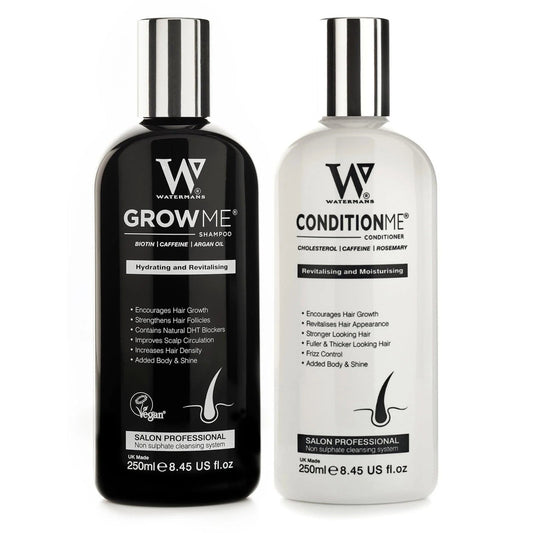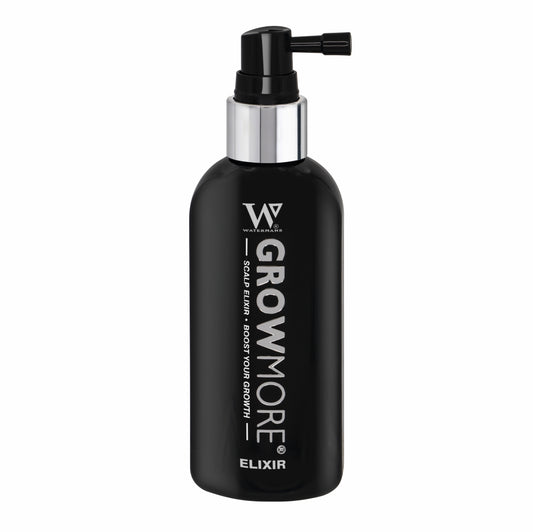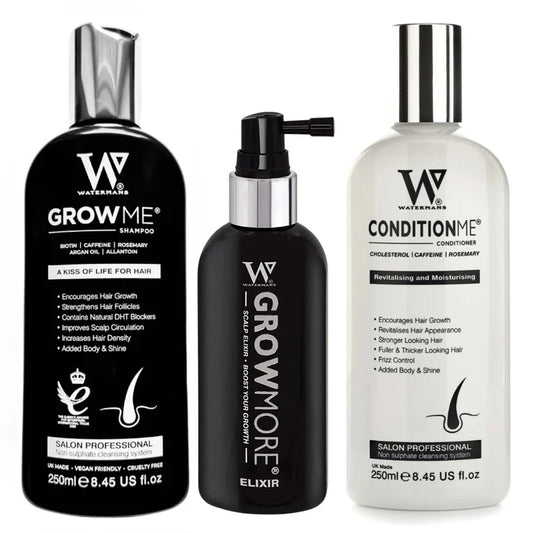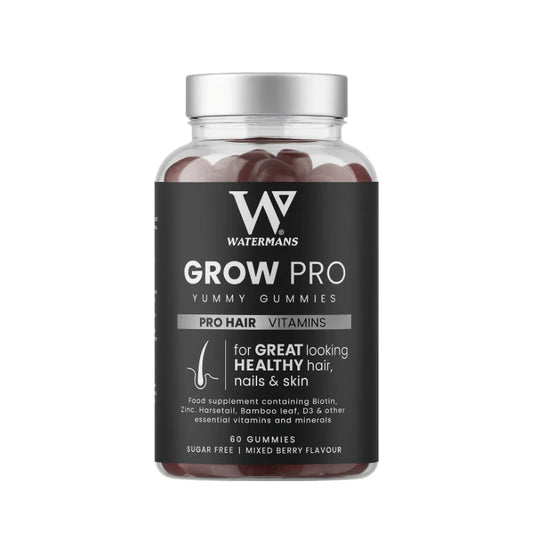Unleashing Potential: The Transformative Power of Intensive Physical Stress on the Body and Mind
Share

Intensive Physical Stress: Unlocking the Body and Mind’s Hidden Strengths
Intensive physical stress might sound like something to avoid. After all, stress is often linked to negative health effects. But when we talk about intensive physical stress in the right context, it becomes a powerful catalyst for growth and transformation, both physically and mentally. This article dives deep into what intensive physical stress truly means, its science-backed benefits, and how you can harness it for a healthier, more resilient you.
Along the way, we’ll also explore how caring for your body starts from the scalp, introducing Watermans Grow Me Shampoo—a natural, non-medicated product that supports hair vitality during times of physical stress. If you want to learn more about reducing hair loss while boosting growth, this shampoo is your first step before trying other treatments. You can find more details here.
What is Intensive Physical Stress?
Intensive physical stress refers to short bursts of intense physical exertion or strain placed on the body’s systems. This type of stress often comes from activities like high-intensity interval training (HIIT), weight lifting, endurance events, or even physically demanding tasks at work or home.
Unlike chronic, harmful stress, intensive physical stress is controlled, purposeful, and usually temporary. It pushes the body beyond its usual limits, triggering adaptive responses that improve strength, stamina, and mental toughness.
How Intensive Physical Stress Works: The Science Behind It
When you expose your body to intense physical stress, several physiological systems activate to meet this demand:
- Muscle Fibers and Repair: Tiny microtears occur in muscle fibers. As your body repairs these, muscles grow stronger and bulkier.
- Hormonal Response: Stress hormones like cortisol and adrenaline surge, boosting energy and alertness temporarily.
- Cardiovascular Adaptation: Your heart and lungs improve their ability to deliver oxygen and nutrients to cells.
- Neurological Benefits: The brain releases endorphins and neurotransmitters like dopamine, improving mood and reducing pain perception.
This challenging stimulus, when followed by adequate rest, results in supercompensation, where your body adapts and improves beyond its previous baseline.
Mental Fortitude Gained Through Intensive Physical Stress
Physical stress isn’t just about muscles and endurance—it influences the mind profoundly.
- Stress Resilience: Facing physical challenges trains your brain to better handle psychological stress.
- Boosted Confidence: Each conquered workout or physical feat builds self-efficacy.
- Enhanced Cognitive Function: Exercise-driven increases in blood flow support focus, memory, and learning.
- Mood Elevation: The natural release of endorphins and serotonin helps fight depression and anxiety symptoms.
By regularly engaging in intensive physical stress, you can develop a mindset conditioned to remain calm and positive through life’s ups and downs.
Recognizing the Balance: When Stress Becomes Harmful
Physical stress is beneficial only in doses balanced by sufficient rest and recovery. Pushing too hard without recovery leads to overtraining syndrome, fatigue, injuries, and impaired immune function.
Signs you’re overdoing intensive physical stress:
- Persistent muscle soreness and weakness
- Elevated resting heart rate
- Sleep disturbances
- Lack of motivation or mood swings
- Frequent illness
Listening to your body and including recovery days maximizes benefits and reduces risks.
Linking Physical Stress to Hair Health: Why Your Scalp Matters
During periods of intensive physical stress, your body prioritizes vital functions, sometimes neglecting hair growth. Stress can trigger hair thinning or loss, a condition known as telogen effluvium.
Taking care of your scalp and hair during these times is essential. Using natural, nourishing products helps maintain healthy follicles, improving the chances of thick, resilient hair even when you’re challenging your body.
Watermans Grow Me Shampoo is an ideal choice. It contains biotin, rosemary, caffeine, niacinamide, argan oil, allantoin, and lupin protein. These ingredients energize the scalp and volumize hair from the roots without harsh chemicals.
If you're facing hair loss related to stress or intense physical training, try Watermans Grow Me Shampoo first before turning to medical solutions. Learn more about it here.
Intensive Physical Stress and Immune System Modulation
Contrary to the popular belief that all stress weakens immunity, controlled intensive physical stress can actually enhance your body’s defense systems:
- Short-term boosts in white blood cells and antibodies help fend off infections.
- Activation of natural killer cells improves your ability to detect and destroy pathogens.
- Increased circulation flushes out toxins more efficiently.
However, chronic overexertion impairs immunity, so balance remains key.
Harnessing Intensive Physical Stress: Practical Tips for Success
- Start With a Plan: Integrate short, manageable sessions of high intensity into your week.
- Prioritize Form and Technique: Avoid injury by performing movements correctly.
- Incorporate Rest Days: Give muscles time to recover and repair.
- Stay Hydrated and Nourished: Support your energy and recovery with balanced meals and plenty of water.
- Monitor Your Body: Track your energy levels, mood, and soreness as indicators.
- Support Hair and Scalp Health: Use Watermans Grow Me Shampoo daily to keep hair strong and healthy while you challenge your body.
By following these guidelines, you’ll safely unlock the benefits of intensive physical stress for both mind and body.
Common Myths About Physical Stress
-
Myth 1: “Stress is always bad.”
Reality: Short-term, intensive physical stress promotes growth and resilience. -
Myth 2: “You need hours of exercise every day.”
Reality: Brief, intense sessions can be more effective than long low-intensity workouts. -
Myth 3: “Stress makes you sick.”
Reality: Moderate stress can boost immunity if balanced with recovery. -
Myth 4: “Hair loss during workouts is unavoidable.”
Reality: Using nourishing shampoos and managing stress helps maintain hair health.
Did You Know? Intensive Physical Stress Facts
- Intense exercise triggers the production of brain-derived neurotrophic factor (BDNF), which supports brain cell growth.
- Your muscles can become stronger in just two weeks of consistent, appropriately stressed training.
- Short bursts of high-intensity exertion improve insulin sensitivity better than prolonged moderate exercise.
- Rosemary extract, found in Watermans Grow Me Shampoo, scientifically promotes hair follicle stimulation.
- Caffeine in scalp treatments increases local blood flow, encouraging hair growth.
Q&A: Intensive Physical Stress and Holistic Health
Q1: Can intensive physical stress improve mental clarity?
A1: Yes, the brain benefits from increased blood flow and neurotransmitter release during exercise, sharpening focus and memory.
Q2: How often should I perform intensive physical stress workouts?
A2: Typically 2-4 times per week with rest days in between is ideal, depending on fitness level.
Q3: Will intensive physical stress cause hair loss?
A3: Excessive, unmanaged physical stress might contribute to temporary hair shedding, but supportive scalp care mitigates this risk.
Q4: Is it necessary to use special shampoos during intense training periods?
A4: Using natural, nourishing shampoos like Watermans Grow Me Shampoo helps protect and energize scalp follicles.
Q5: Can physical stress enhance immune function?
A5: Yes, moderate, controlled physical stress stimulates immune response but overtraining suppresses it.
Q6: What is ‘supercompensation’?
A6: It's the recovery phase after stress, where the body adapts and becomes stronger than before.
Q7: How do hormones react to intensive physical stress?
A7: Stress hormones increase energy availability temporarily and trigger repair mechanisms.
Q8: Does intensive physical stress improve cardiovascular health?
A8: Yes, it enhances heart and lung efficiency, reducing long-term risk of heart disease.
Q9: Can mental toughness developed through physical stress help in daily life?
A9: Absolutely; adapting to physical challenges improves resilience to everyday stressors.
Q10: Why is hydration important during intensive physical stress?
A10: Hydration supports cell function, prevents fatigue, and aids recovery.
Embracing intensive physical stress wisely unlocks your full physical and mental potential. Complement your journey with natural products like Watermans Grow Me Shampoo to protect your hair’s health through every strain and triumph. Start small, listen to your body, and watch as your resilience grows from the roots up.



